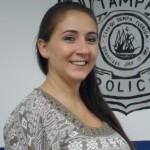Telecommunicator Spotlight: Heather Hanson
Prior to joining the Tampa (Fla.) Police Department as a communications technician I, in November 2009, Heather Hanson lived in North Carolina and worked as a company sublet for OnStar. Upon being hired by the Tampa PD, she eventually progressed to a communication technician III and trainer. She worked as a communications technician III and trainer for almost two years, became state certified and has taught emergency dispatching classes at the dispatch academy.
As a dispatcher, Hanson possesses the vital skills necessary to be successful in the job. She is able to talk to people, build rapport, think quickly on her feet and outside the box, and she handles stress effectively. “I excel very well at functioning under stress. You’re thrown into it; you can’t prepare for it,” Hanson says. “My coping skills are very high. I’m really good at relating to people. I try to identify with them and talk at their level.”
When she started as a new dispatcher, Hanson realized it was difficult to control the call. However, it became easier with experience and, “once you learn to talk to people,” she says.
Hanson recalls when a woman called for the second time about a loud noise/neighborhood dispute. While on the phone with the caller, Hanson heard 11-12 shots in the background and the woman told Hanson her mother had been shot. “She started freaking out,” Hanson says. She had to calm the caller down to be able to obtain the necessary information to dispatch the call. After she was finished with the call, Hanson took a break and walked around a few minutes to process the call. She replayed the episode in her head, reflected upon it and affirmed that she did what she had to do during the call. She later followed up and learned that the woman who had been shot survived.
Dispatching is a job that is fluid and no two shifts are ever alike. “I love that it is never the same,” Hanson says. She likes the calls she receives on the non-emergency line because she is able to have a conversation in which people are usually not screaming. “I’m able to give them information. I may be able to solve a problem on the non-emergency line so cops can go to a more critical call,” she says.
One call that stands out in Hanson’s mind involved a homicide. An upset woman called and provided Hanson the address but would not tell her what was occurring. The woman was running for her life while she was on the phone with Hanson, who was trying to ascertain what was happening. What she ultimately learned was that the boyfriend of the caller’s mother had killed her mother with a machete and was running after the caller in an attempt to also kill her.
When two Tampa police officers were killed in the line of duty in 2010, Hanson stepped up to the plate and worked the phones at the command post. “It made me feel good to do something connected to it—to feel we were helping. It was crucial, I think,” Hanson says.
Hanson is an active outdoor person who enjoys doing anything physical, including kayaking and playing tennis, to help relieve stress from the job. Most of her friends are employed in the field.
Hanson has been recognized for her performance. She received the 2012 Employee of the Month Award from the Communications Bureau of the Tampa Police Department. Her family is very proud of her.
Hanson is passionate about what she does. “Passion is absolutely key. My greatest reward is that I love knowing I solve problems and that I help police officers get home at night,” Hanson says.
Her fondness and affinity for dispatching and her increased appreciation for the thin blue line has prompted her to move forward in her career. Consequently, she is now part of a scholarship program that has enabled her to enroll in the police academy, which she is now halfway through.
Hanson converted from full-time to part-time status and returned to being a communications technician I to allow her to continue to dispatch while she goes through the police academy. Her enthusiasm for dispatching has notably evolved into a new calling where the knowledge and skills she obtained as a dispatcher will serve her well. “I have a passion for the field. I love it,” Hanson says.
About the Author
Karen L. Bune serves as an adjunct professor at George Mason University and Marymount University in Virginia, and is a consultant for the Training and Technical Assistance Center for the Office for Victims of Crime and the Office of Juvenile Justice and Delinquency Prevention, U.S. Department of Justice. She is a nationally recognized speaker and trainer on public safety issues. Bune is board certified in traumatic stress and domestic violence, and she is a fellow of The Academy of Experts in Traumatic Stress and the National Center for Crisis Management. She serves on the Institutional Review Board of The Police Foundation, Washington, D.C.


